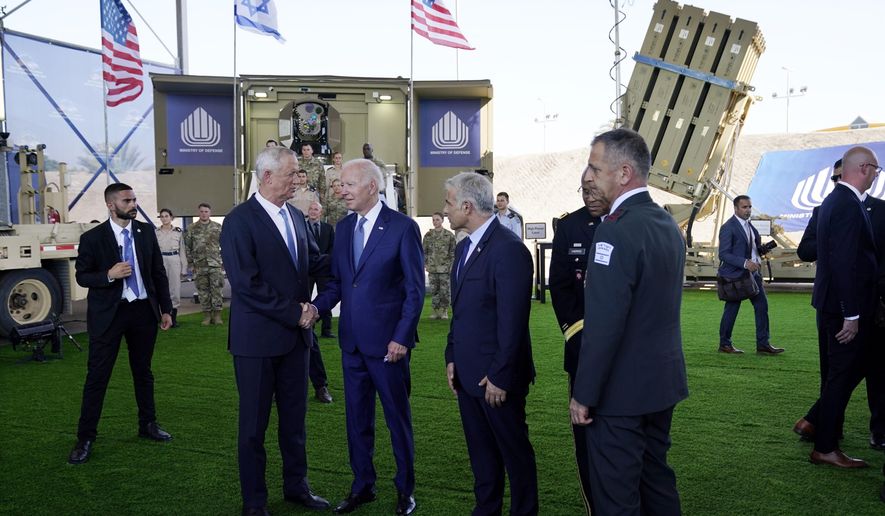TEL AVIV, Israel — The White House said President Joe Biden would try to limit physical contact during his Middle East trip because of concern about rising COVID-19 cases - but the president swiftly reverted to his old-school, back-slapping ways after landing in Israel on Wednesday.
He doled out a few fist bumps after stepping off the plane but then threw an arm around Israeli Prime Minister Yair Lapid and shook hands with former Prime Minister Benjamin Netanyahu.
The issue of contact is arising amid intense speculation about Biden’s upcoming meeting with leaders in Saudi Arabia and whether he will shake hands with Crown Prince Mohammed bin Salman, who U.S. intelligence officials said probably sanctioned the killing of a critic.
It remained to be seen how Biden would greet other Israeli, Palestinian and Arab leaders during his trip, which includes a summit in Saudi Arabia of the Gulf Cooperation Council.
Later Wednesday in Jerusalem at Yad Vashem, Israel’s memorial to Holocaust victims, Biden held hands and kissed the cheeks of survivors Rena Quint, 86, and Giselle Cycowicz, who is about 95.
“Did you see the president hug me?” Quint asked. “He asked permission to kiss me and he kept on holding my hand and we were told not to touch him.”
PHOTOS: Amid COVID worries, fist bumps for Biden — with exceptions
A new omicron variant, which is able to more easily evade immunity from vaccinations and previous infections, has revived concerns about the threat of the pandemic.
“We’re trying to minimize contact as much as possible where we can,” White House press secretary Karine Jean-Pierre told reporters traveling aboard Air Force One with the president.
But such precautions did not appear to be in place on Tuesday before Biden left for the Middle East, when he mingled and shook hands with members of Congress at a White House picnic.
Biden is set to meet with Saudi King Salman and the crown prince when he flies to the kingdom on Friday. The highly anticipated meeting is being closely scrutinized as the White House looks to reset the U.S.-Saudi relationship after a rocky start in the Biden presidency.
As a candidate, Biden had vowed to make Saudi Arabia a “pariah” nation for its human rights record. The president last year also angered the Saudis by publicly releasing a U.S. intelligence report that determined that the crown prince, who is often referred to by his initials MBS, likely approved the 2018 killing of U.S.-based journalist Jamal Khashoggi, a fierce critic of the kingdom’s leadership.
The Democratic president’s plan to meet MBS has been criticized by human rights activists who accuse Biden of backsliding on a vow to make human rights a central pillar of his foreign policy.
Israeli media reported this week that the White House had told Lapid’s office that Biden would refrain from shaking hands during the visit due to the surge in COVID-19 infections in the U.S. and Israel.
Jean-Pierre did not say whether such a message was conveyed to the Israelis.
Before Biden travels abroad, White House officials work with host nations to coordinate COVID-19 protocols, including testing for anyone expected to come in close contact with Biden. It’s not a perfect system, as Biden often decides to greet people in large crowds that may not have been universally tested. Separately, everyone traveling in the presidential entourage is required to be tested at least once daily, in addition to any host country protocols.
The no-handshake guidance comes as the White House has emphasized that COVID-19 should not disrupt daily life due to the availability of tests and therapeutics. Biden’s prior overseas trips - including a visit to Europe last fall during the surge in cases caused by the delta variant - did not include attempts to curtail Biden’s handshakes.




Please read our comment policy before commenting.